1500 Common Parenting Phrases in Mandarin Chinese and Cantonese
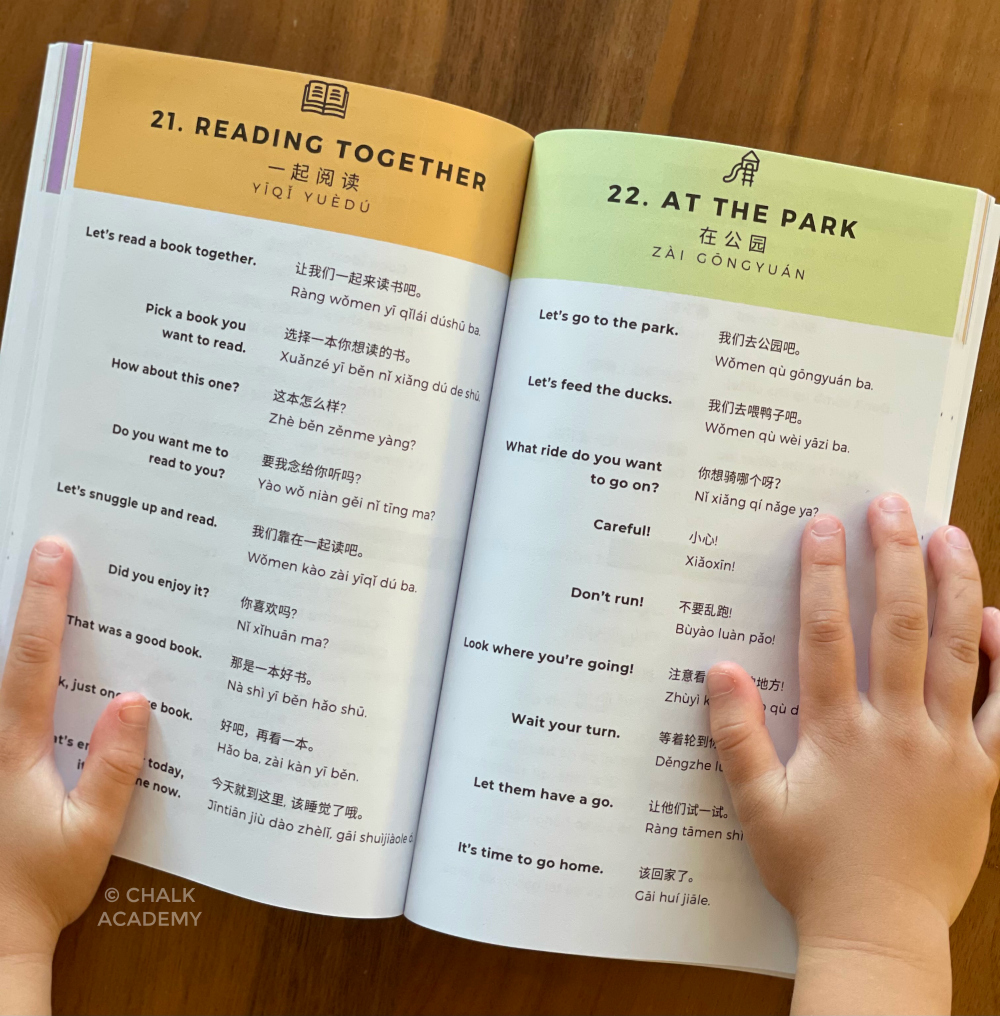
Years ago, when I first began to learn Chinese with my kids, I tediously researched common Chinese parenting phrases. Now, parents can use a convenient and affordable phrasebook, Everyday Mandarin for Parents or Everyday Cantonese for Parents!
Although I’m fairly conversational in Mandarin now, I bought the phrasebook to fill gaps in my vocabulary. In English, I can rephrase sentences and think of several synonyms. But I sometimes only know one way to express an idea in Chinese.
This book has helped me speak Chinese to my kids. If only this existed a few years ago when I first started to learn! I’m excited to show you this amazing phrasebook and common Mandarin parenting phrases.
Chalk Academy is reader-supported. Some of the links are affiliate links. When you buy something through an affiliate link, we may earn a very small commission at no cost to you. Details here.
Common Chinese Parenting Vocabulary Books
Check out these 5-star Chinese parenting phrasebooks.
Audio for common Chinese parenting vocabulary
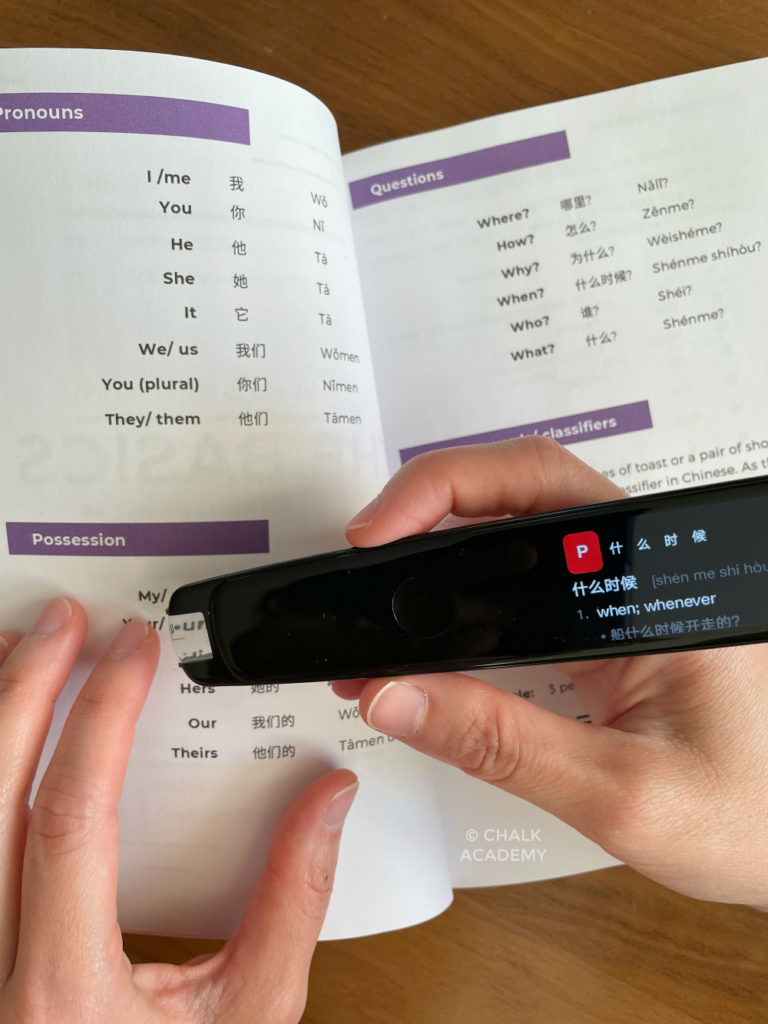
Mandarin speakers can use the Youdao Dictionary Reading Pen with this book.
Alternatively, you can create an account on author Ann Hamilton’s website to access Mandarin and Cantonese parenting phrases for free.
Native Chinese speakers read all the narrations. Before purchasing the books, you can listen to the narrations for a preview.
Read this: The Best Chinese Picture Dictionaries for Kids and Parents!
Review of Everyday Mandarin for Parents
Everyday Mandarin for Parents starts with an overview of pronouns, possessive nouns, and common measure words (eg, classifiers). It’s easy to find relevant words because the book is organized into the following topics:
- Daily routine
- Health and personal care
- Daily activities
- Early learning and play
- Eating
- Social skills and emotions
- Sleeping
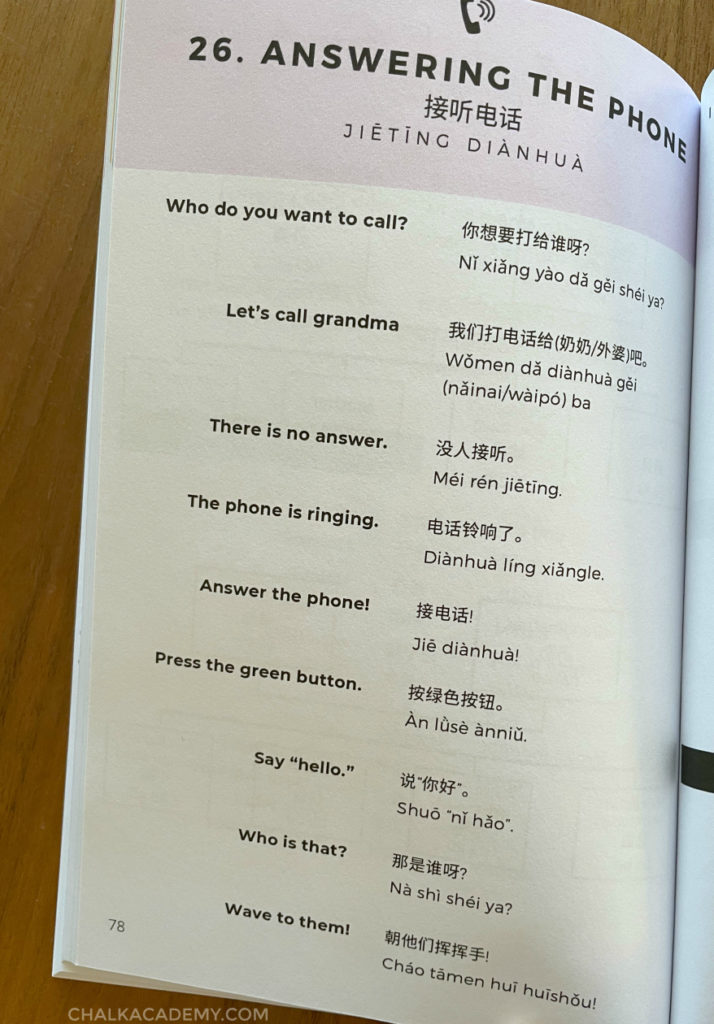
I love the clean and uncluttered layout. If you like to take notes, there’s plenty of white space in the margins.
Though the Chinese characters could be larger, it’s still easy to read.
The book is also lightweight and portable. To study on-the-go, it should fit in a small backpack or handbag.
Pastel colors and simple icons highlight each category in Everyday Mandarin for Parents. However, the Cantonese version is currently black-and-white only.
What Chinese phrases should parents learn first?
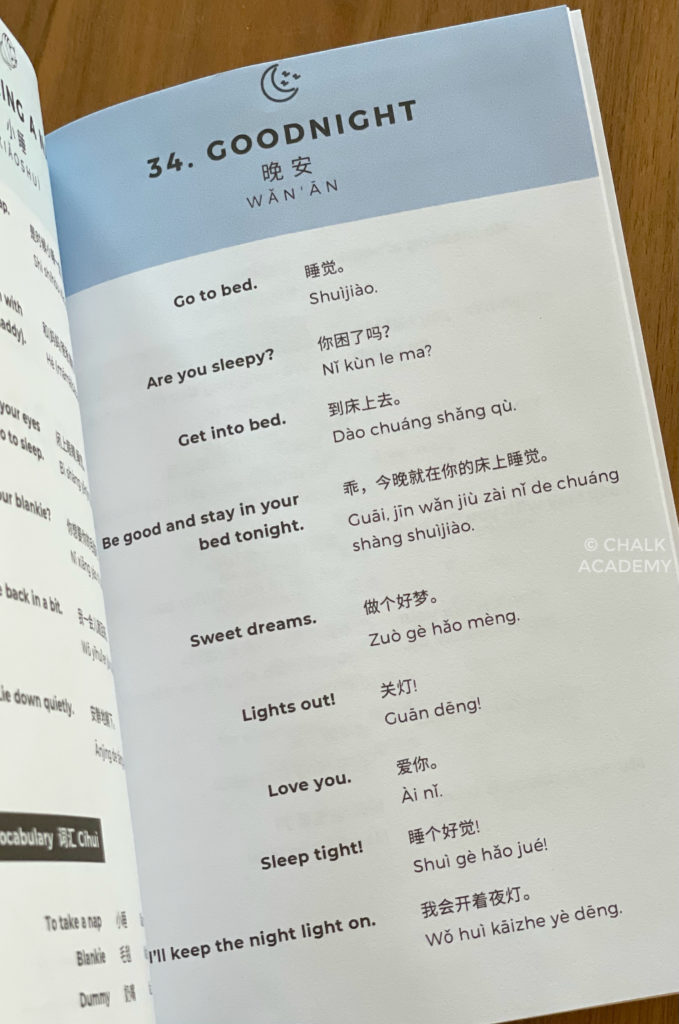
Most Chinese books for adult learners are geared toward business travelers.
However, the most relevant Chinese phrases should help parents communicate with their children.
Priority topics include basic needs, food, safety, play, hygiene, and daily routine.
Try this: How to Make the Switch from Dominant to Minority Language
Tips for learning Chinese phrases as an adult
Kids’ brains are like sponges – they soak up languages fast!
But adults sometimes take a little longer to learn new language rules. Not to mention also finding time to sit down and concentrate. As a busy parent, I get it!
Set time aside in your schedule to practice
If learning Chinese with your children is important, dedicate time in your schedule for language practice. This can mean 5 minutes before breakfast, 15 minutes during your work commute, or half an hour a weekend after your child goes to bed.
Find a time that works for you and your schedule, and stick to it. You can do it!
Baby steps
Remember, every step counts and gradually builds momentum. Like running a marathon, learning to speak Chinese requires practice, persistence, and endurance.
Building a solid language foundation also means finding the best pace for you and your family. Start with just a few common Chinese words or phrases.
Initially, saying those first Chinese words might feel awkward. Over time, those first baby steps will become smoother and stronger strides!
Use other Chinese resources
When extra busy or tired, use audio and video to learn when you can’t sit down to read.
Watch Chinese TV shows, listen to Chinese audiobooks, practice on the Duolingo app, or listen to Chinese music.
You can learn more about how I learned Chinese with my children here.
Debating between simplified & traditional Chinese characters?
Common phrases parents say in Mandarin Chinese
A few years ago, I jotted down some Mandarin phrases I often used. They don’t overlap with the book, so I hope these extra Chinese phrases I’ve shared below can help you learn!
They are listed in English, simplified Chinese, traditional Chinese (if different), and Hanyu Pinyin.
Common Chinese phrases about directions
- Come here!
- 过来!
- Guòlái!
- Where?
- 哪里?
- 哪裡?
- Nǎlǐ?
- Over there?
- 在那边?
- 在那邊?
- Zài nà biān?
- Here!
- 这里!
- 這裡!
- Zhèlǐ!
- Do you want to go up?
- 你想上去吗?
- 你想上去嗎?
- Nǐ xiǎng shàngqù ma?
- Or downstairs?
- 还是楼下?
- 還是樓下?
- Háishì lóu xià?
- I can’t find you!
- 我找不到你!
- Wǒ zhǎo bù dào nǐ!
- I found you!
- 我找到你!
- Wǒ zhǎodào nǐ!
- Please sit.
- 请坐。
- 請坐。
- Qǐng zuò.
- Please stand
- 请站起来。
- 請站起來。
- Qǐng zhàn qǐlái.
Common Chinese parenting phrases about affection
- Mommy and Daddy love you!
- 妈妈爸爸爱你!
- 媽媽爸爸愛你!
- Māmā bàba ài nǐ!
- Do you need a hug?
- 你要抱抱吗?
- 你要抱抱嗎?
- Nǐ yào bàobào ma?
- Do you need me to carry you?
- 你需要我背着你吗?
- 你需要我背著你嗎?
- Nǐ xūyào wǒ bèizhe nǐ ma?
- Can I give you a kiss?
- 我能亲一亲你吗?
- 我能親一親你嗎?
- Wǒ néng qīn yī qīn nǐ ma?
- I like being with you.
- 我喜欢和你在一起。
- 我喜歡和你在一起。
- Wǒ xǐhuān hé nǐ zài yīqǐ.
For more encouragement, please read 30 Positive Affirmations I Tell My Kids Everyday (English / Chinese Printable)
Common Chinese phrases about the daily routine
Sleep
- Good morning!
- 早上好!
- Zǎoshang hǎo!
- Did you sleep well last night?
- 昨晚睡得好吗?
- 昨晚睡得好嗎?
- Zuó wǎn shuì dé hǎo ma?
- Are you tired?
- 你累了吗?
- 你累了嗎?
- Nǐ lèile ma?
- Do you want to sleep?
- 你想睡觉吗?
- 你想睡覺嗎?
- Nǐ xiǎng shuìjiào ma?
- Rest well!
- 好好休息!
- Hǎo hǎo xiū xi!
- Sleep well!
- 睡得好!
- Shuì dé hǎo!
Try this: Empower Kids with a Visual Daily Routine Chart in English, Chinese, Korean
Schedule
- What time is it now?
- 现在几点了?
- 現在幾點了?
- Xiànzài jǐ diǎnle?
- Can you hurry up?
- 你能快点吗?
- 你能快點嗎?
- Nǐ néng kuài diǎn ma?
- Please slow down.
- 请慢一点。
- 請慢一點。
- Qǐng màn yīdiǎn.
- I’ll wait for you.
- 我会等你的。
- 我會等你的。
- Wǒ huì děng nǐ de.
- Let’s go.
- 我们走吧。
- 我們走吧。
- Wǒmen zǒu ba.
Common Chinese parenting phrases about food
- Are you thirsty?
- 你渴吗?
- 你渴嗎?
- Nǐ kě ma?
- Are you hungry?
- 你饿了吗?
- 你餓了嗎?
- Nǐ èle ma?
- I’m so hungry!
- 我太饿了!
- 我太餓了!
- Wǒ tài èle!
- What do you want for breakfast?
- 你早餐要吃什么?
- 你早餐要吃什麼?
- Nǐ zǎocān yào chī shénme?
- What’s for dinner?
- 晚餐吃什么?
- 晚餐吃什麼?
- Wǎncān chī shénme?
- What do you want to eat for lunch?
- 你午餐想吃什么?
- 你午餐想吃什麼?
- Nǐ wǔcān xiǎng chī shénme?
- I want to eat _______.
- 我想吃 _______。
- Wǒ xiǎng chī _______.
- Do you want Mommy and Daddy to feed you?
- 你要妈妈和爸爸喂你吗?
- 你要媽媽和爸爸餵你嗎?
- Nǐ yào māmā hé bàba wèi nǐ ma?
- Does it taste good?
- 好吃吗?
- 好吃嗎?
- Hào chī ma?
- This is delicious.
- 这个好吃。
- 這個好吃。
- Zhège hào chī.
- This smells / tastes bad.
- 这味道不好。
- 這味道不好。
- Zhè wèidào bù hǎo.
- I’m full!
- 我饱了!
- 我飽了!
- Wǒ bǎole!
Try this: Kids Water, Snack, and Self-Care Station Makes Life Easier for Everyone
Common Chinese phrases about hygiene
- Do you have to pee?
- 你要尿尿吗?
- 你要尿尿嗎?
- Nǐ yào niào niào ma?
- Do you need to poop?
- 你需要大便吗?
- 你需要大便嗎?
- Nǐ xūyào dàbiàn ma?
- Wash hands!
- 洗手!
- Xǐshǒu!
- Wipe it clean!
- 擦干净!
- 擦乾淨!
- Cā gānjìng!
- Let’s brush our teeth together!
- 让我们一起刷牙!
- 讓我們一起刷牙!
- Ràng wǒmen yīqǐ shuāyá!
- That’s too dirty.
- 那太脏了。
- 那太髒了。
- Nà tài zāngle。
- It’s all clean now!
- 现在都干净了!
- 現在都乾淨了!
- Xiànzài dōu gānjìngle!
Common Chinese parenting phrases about safety
- Be careful! (Watch out!)
- 小心!
- Xiǎoxīn!
- That’s dangerous.
- 这很危险。
- 這很危險。
- Zhè hěn wéixiǎn.
- Walk slowly, don’t run.
- 慢慢走, 不要跑。
- Màn man zǒu, bùyào pǎo.
- This place is safe.
- 这个地方很安全。
- 這個地方很安全。
- Zhège dìfāng hěn ānquán.
- Are you hurt?
- 你受伤了吗?
- 你受傷了嗎?
- Nǐ shòushāngle ma?
- That’s not okay.
- 不行。
- Bùxíng.
Try this: 7 Natural Ways to Improve Communication Through Play
Common Chinese phrases about playing
- What do you want to play?
- 你想玩什么?
- 你想玩什麼?
- Nǐ xiǎng wán shénme?
- Do you want this toy?
- 你要这个玩具吗?
- 你要這個玩具嗎?
- Nǐ yào zhège wánjù ma?
- Please give me the toy.
- 请给我玩具。
- 請給我玩具。
- Qǐng gěi wǒ wánjù.
- This is fun!
- 这个很有趣!
- 這個很有趣!
- Zhège hěn yǒuqù!
Are you learning Chinese with your kids, too?
Where are you on your journey, and what inspires you to learn Chinese? How is it going so far? Please share in the comments! I’d love to hear about your story!
JUMPSTART GUIDE TO
TEACHING KIDS CHINESE
7 Days of Practical Tips Delivered to Your Inbox from Dr. Betty
CHALKACADEMY.COM
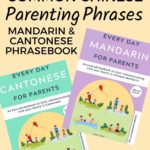
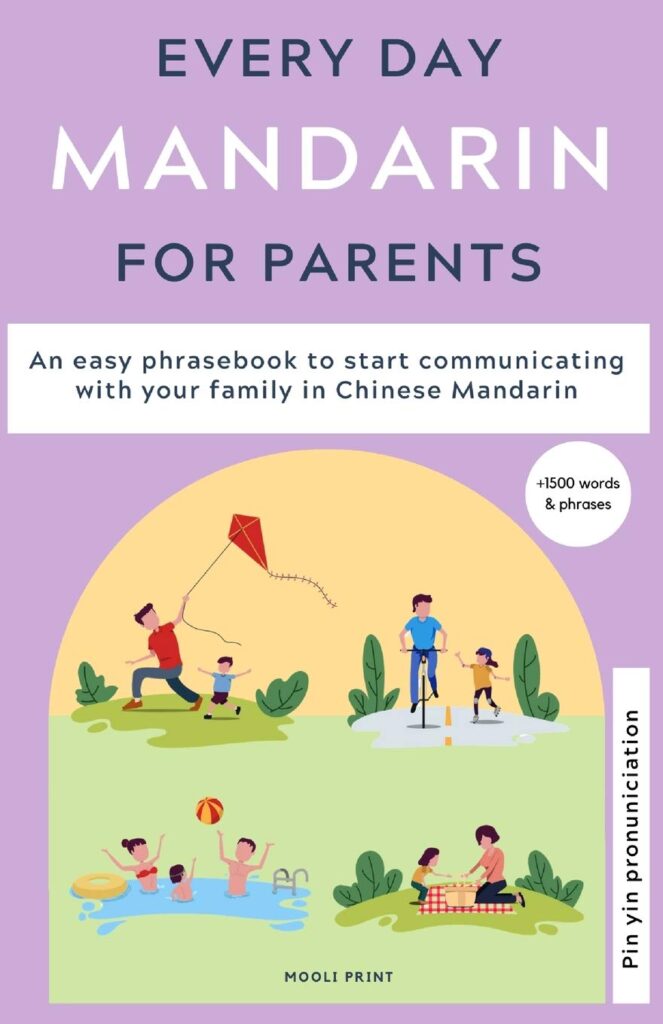
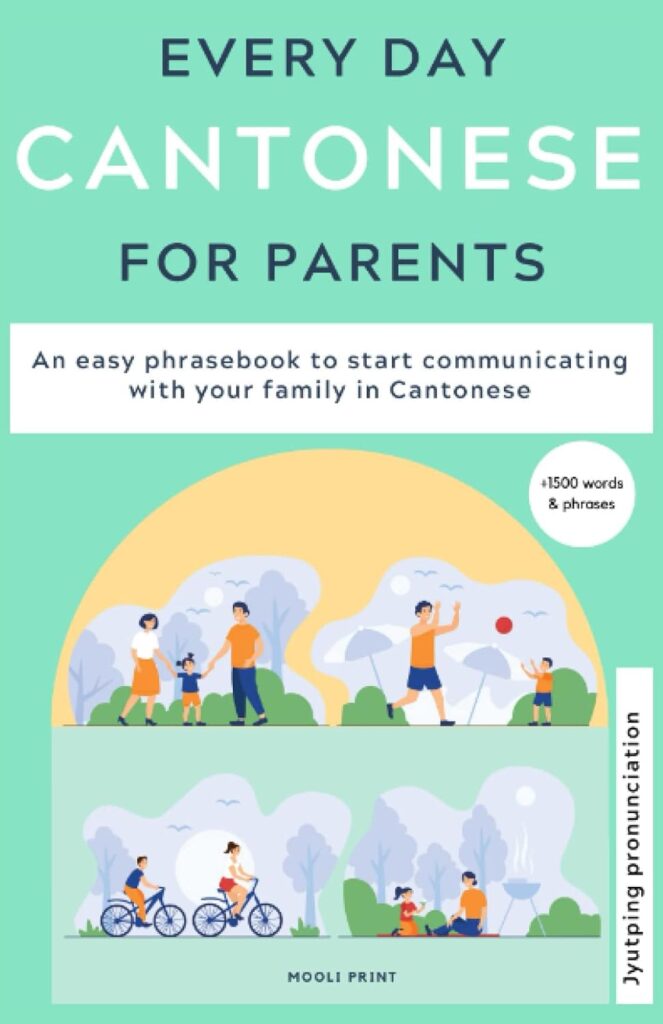
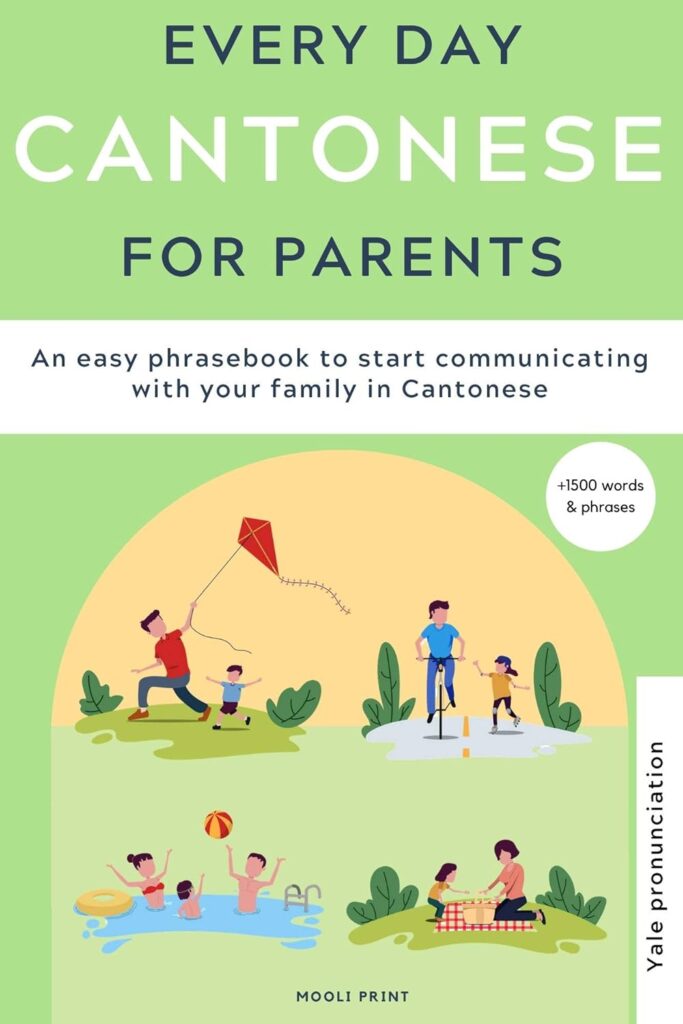
Hi there, this is a great blog. I’m curious if you have any recommendations for Everyday Mandarin for Parents in Zuyin and traditional chinese. Thank you!
Hi Julie, thanks for reaching out! I don’t think the author has come out with a traditional/Zhuyin version, only the versions listed toward the top of this post. However, the author’s website has Mandarin narrations which I hope can still be helpful for your family. You can also try this dictionary with traditional Chinese and Zhuyin.
I am first generation immigrant from Taiwan and my formal schooling in Mandarin was interrupted after third grade. After marrying, I realized the exhaustion of translating Mandarin into English to keep my husband in a loop was detrimental for me. My son was raised by a nanny who only spoke Mandarin to him so he fan understand basic conversation and speaks more comfortably in English since starting school!
Knowing how to speak Mandarin versus teaching it are two complete playing fields. having Chalk Academy has been inspirational and comforting to have Betty’s personally respond to my questions! It will be so useful to the book to add to my own sentence bank.
Currently trying to raise my bicultural son in Mandarin without a fluent grasp of it myself (grew up in an English-speaking country, so in a similar situation to you, which is why I find your page so inspiring and relatable!). It’s tough during the pandemic with language schools and play groups shut down, and with the Chinese-speaking relatives on the other side of the world. But it‘s been a refreshing journey so far, because I can now revisit and relearn Mandarin together with my son!
Very little Chinese and trying to learn with my baby. Thankful for your blogs and recommendations!
Still in the beginning, need to relearn Chinese as well so I could teach my LO. Thank you so much for your reviews, blogs and suggestions, it’s really helpful and inspiring!
Hi
I’ve been a regular visitor of your wonderful blog since I’ve recently discovered it while googling for online Chinese teaching resources. Your blog is full of useful informations and amazing resources to start our bilingual journey with my almost two year old son. You are def. an inspiration to many families like us! Xie xie!
Anyhow, my current fluency in Mandarin Chinese is at beginner level and I have been using our google home to help me with some translation 🙂 . I grew up speaking Burmese with little exposure to Chinese and my husband is Singaporean but, he is somehow more comfortable speaking English to our son. So, I was looking for something like this book or printable (which you have kindly provided on this post -thank you!) that helps me speak everyday Chinese to our son so, this book would be so useful in our household! And we have also been enjoying doing some activities that you created (esp. the envelope activity and matching heart shapes to learn the names of our family members). Our little bilingual journey is going well and we’ve been using a lot of your resources from this blog! Thanks!
My husband is Chinese and his parents only speak Chinese. I plan being a stay at home mom soon so my language will be what my children will pick up most. How to order food isn’t going to help too much with that endeavor though so I was really excited when I saw this book. I know my trying to pick up the Chinese to teach my kids means a lot to my husband’s family too. Thanks for the great resources!
I am basic conversational in Cantonese. I used to be pretty fluent because i had my grandparents to speak with. But of course, overtime, I slowly stopped speaking because I dont really have anyone to speak Cantonese with other than employees at the Chinese grocery stores. Hehe. What inspires me to learn Chinese is my 9 month old son. As I grow older, I realize the importance of speaking my native language. And I regret not utilizing the language more because I was so embarrassed to speak Cantonese with other people for multiple reasons. So far, I have bought some Chinese children’s book so I am excited to get them in the mail. I am also considering decking out our house with labels in Chinese soon! 🙂
I can read and write in Chinese (newspaper-level). While I’m a native Cantonese speaker, I learned my written Chinese at Mandarin school. I’m trying to teach my younger daughter how to speak Mandarin (she goes to a Mandarin daycare), but I find that I really lack the vocabulary for mother-child conversations. I already have the Cantonese one in Yale, and I actually use it to remind myself to speak more Cantonese at home and my older daughter practices with me. I’m excited there’s actually a mandarin equivalent!
Our family’s (minus husband) current fluency in Mandarin is conversational and although we have limited resources and speaking at home, the kids have been speaking and listening more these past 3 weeks with visiting grandparents. Being an American born Chinese, I realized the importance of keeping this heritage language and want to pass it onto my mixed children. It’s always a struggle to get everyone to speak it inside the house and practice, but lately, we pretend the grandparents do not know English and the kids (who are unaware of how fluent the grandparents are in English) have no choice but to speak Chinese to them. And we are reading more Chinese books lately.
Just wanted to say how amazing you are for sharing all those additional phrases for parents just starting out on their Chinese-learning/teaching journey! And in both SC & TC too!! I am thanking you on behalf of all the parents that I know will benefit from your freely sharing of this kind of information. Thank you!
I’m beginner in both Mandarin and Cantonese. I’m hoping to raise my daughters to be somewhat trilingual since my parents speak Cantonese and my in-laws speak Mandarin!
I’m semi fluent in conversational Cantonese and beginner in mandarin. I’m motivated to learn more with the kiddos for heritage and practical reasons. It’s hard though and really takes an effort since no one else around speaks, but trying my best to get what I can in!
I grew up speaking Cantonese at home. My only source of dialogue was with my parents. Learning to write and read was the hardest part, as there was lack of resources overseas.
I have a son, who since birth I’ve spoken to in Cantonese. I hope that he will be able to learn the basics of reading and writing. And for me to know as well.
With the help of Facebook groups and online resources, its been a big motivator to learn to read and write.
And I know that the struggles are worth it when you see results.
🙂
I’m learning Mandarin with my 4 year old daughter because I am Chinese and regret rebelling against my parents and refusing so speak as a child. I’d like to help my children be bilingual because I know there are so many more doors open to them if they are. I’m hoping to make the learning experience for my children more motivating and less painful 🙂 We started this summer and have been slowly gaining some vocabulary to speak very basic sentences around the house. We’ve got so far to go though and I’m so grateful for this blog with the resources and encouragement! Thanks!
I would say I am more fluent in tagalog but would like to learn Chinese since technically I am Chinese, would love to learn and teach it to my kids so we can go to places like China or Taiwan and be able to converse. These book is great for everyday use thank you so much for sharing! I am honestly inspired by you, when you learned Chinese by yourself that is amazing! Thank you for your research and acquiring these books and resources as well as your honest opinions and reviews! It is such a great help for me, because I have limited resources but with your blogs and ig post (free printable, giveaways), it can be possible that I can learn some Chinese! 😁 thank you so much! May God continue to bless you more!
I just started over a year ago, using Duolingo, to learn basic phrases. So, I’m very beginning level and my fluency is not very fluent. My friend introduced me to your blog! Thank you for all the wonderful resources you provide! I’m inspired to be bilingual because I want my daughter to know her Chinese side! I want her to be bilingual.
I’m learning mandarin along with my toddler son. After two semester of language classes in college, there are so many daily life phrases I don’t know 😅